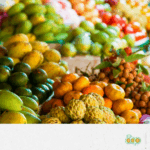Impacts of Covid-19 on the horticultural sector in Sierra Leone
- 18/09/2020
- Posted by: Sandra Borma
- Category: News, Sierra Leone

COLEACP’s surveys in the early months of the pandemic aimed to gather first-hand information on the impact of Covid-19 on operators of horticultural businesses, and assess how support from COLEACP and other partners could best be redirected as a response. These were not intended to be systematic surveys – respondents were self-selecting, and the operators taking part varying greatly in size and operation. But the results provide an illuminating qualitative snapshot of the key impacts of Covid-19 to date, and have been used to inform COLEACP’s and partner organisations’ priorities going forward.
In June 2020, COLEACP conducted a survey of its members in the horticultural sector of Sierra Leone. The three responding companies are in the fresh production and export sector (mainly peppers, leafy vegetables, sweet potatoes and yams, also fruits such as mango and passionfruit). The companies are active on local and European Union markets.
The issues identified as having the highest impacts were disruptions to domestic logistics, cargo costs and limited air freight options.
Sales volumes had changed from the companies’ initial projections: all three companies said that orders were reduced by over 75% during the period March–May. All three reported cashflow challenges, particularly to cover overheads and payments for inputs. However, while two companies reported that prices had fallen compared with the same period in 2019, one company had seen prices rise.
Only one of the three companies had access to an online platform to market its produce. All three said they were still working to identify potential alternative markets; current mitigation activities included selling more on domestic markets, and processing fresh produce.
All three companies said they were unable to guarantee markets to their outgrowers, and two were scaling down new planting schedules. One company had reduced casual workers by 75% and the other two had stopped employing casual workers. All three companies had laid off some permanent staff, and one had to close for a period of more than 7 days.
All of the companies said no direct government support was available to them; one said that it had benefited from delayed payments of taxes and utility bills.
Covid-19 measures recommended by the World Health Organization were understood and applied by the companies on-farm, but slightly less so at packhouse and outgrower levels.
All three companies said that their main problems were financial constraints, and placed cashflow management at the top of their priorities for support. Contingency planning for fresh produce operators, business negotiation skills, and more information on Covid-19-related procedures for farming and packhouse operations were also identified as high priorities.





